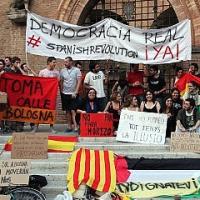
Rome, Turin, Naples, Milan, Reggio Emilia, Padova, Palermo, Brescia, Trieste, Venice, Cagliari, Viareggio, Pavia, Florence, Sassari, Verona, Lecce, Bologna, Pisa – this is a rough list of the major cities where the “Italian revolution” movement – “Real democracy now” – is organising and coordinating public meetings at present.
The movement that started in Spain has, in a few days, already made the rounds in Europe. The splendid example that the Spanish’ young people and workers is giving us these days is bringing many young people to peacefully occupy the streets in Italy as well.
This is a movement that was born spontaneously and has been organising general public meetings in dozens of cities for a week. It is a non-party, but not an apolitical movement. The national manifesto of the Italian group explains: “The movement is a movement of citizens who want to fight the political class and claim a new society that gives priority to life above economic and political interests”.
The name of the Italian movement – “Italian revolution” – reflects a genuine desire for a radical change, and the fact that a whole layer of Italian young people have been inspired by the revolutionary wave in North Africa and the Middle East. “Berlusconi, game over”, read a placard on Piazza del Duomo in Milan, a direct reference to the same slogan targeting Ben Ali in Tunisia a few months back.
One of the most interesting aspects of this movement is in relation to the overall youth character of this protest; there are many young people who are approaching politics and the struggle for the first time thanks to these meetings.
The assemblies that discuss specific issues – such as job insecurity, ecology, or education – should serve to deepen the analysis of the movement, to sharpen the programme points and the demands, and elaborate a method to link their movement with the broad working class. The movement needs to fight for the abolition of all laws which create job insecurity, for a minimum wage and a decent pension for the more than 50% of Italian pensioners forced to live on less than €500 a month, etc.

The large participation of young people in this movement and their enthusiasm are a clear indication of the desire for struggle and action that exists today amongst the youth. The desire to organise and fight against the crisis in the economy, against the politicians and big business, and against the domination of banks and industry that continues to let ordinary people pay for the consequences of the crisis of their system.
At the same time, it is understandable that many young people have many hopes, illusions and sometimes naïve ideas on what is needed to bring the movement forward. In Italy this is indicative of the huge political vacuum that exists today on the left, and of the disorientation provoked by the failure of the current leaderships to propose a viable socialist alternative to the present system. A result is that the protestors don’t necessarily have a rounded out perspective of what those who want a revolution should do and which sectors of society they should seek to mobilise.
The absence of a strong focal point that can organise young people certainly does not erase their desire to fight. But, at the end, if one is not developed, political and organisational weaknesses could affect this movement’s ability to go further, resulting in the anger against the system being “dispersed into thin air”.

Within the limits of our ability, the comrades of Contocorrente (CWI in Italy) are systematically active in this movement, trying to guide the indignation against politicians into the organisation of the real resistance against cuts and austerity policies that capitalism imposes on us.
Unfortunately, it is sometimes hard, in the regular meetings that are taking place, to reach a political common denominator on the major social issues. Contocorrente has tried to explain that a real democracy, which is what the participants to the movement all aim for, could have its real sense only if the majority in society have a real control and say on how the country is run: the nationalisation of the banks and major industries, under the control and management by democratically elected representatives of ordinary working people and youth, would give this idea a concrete meaning.
Special financial appeal to all readers of socialistworld.net |
Support building alternative socialist media Socialistworld.net provides a unique analysis and perspective of world events. Socialistworld.net also plays a crucial role in building the struggle for socialism across all continents. Capitalism has failed! Assist us to build the fight-back and prepare for the stormy period of class struggles ahead. Please make a donation to help us reach more readers and to widen our socialist campaigning work across the world. |
Donate via Paypal |
| M | T | W | T | F | S | S |
|---|---|---|---|---|---|---|
| 1 | 2 | 3 | 4 | 5 | ||
| 6 | 7 | 8 | 9 | 10 | 11 | 12 |
| 13 | 14 | 15 | 16 | 17 | 18 | 19 |
| 20 | 21 | 22 | 23 | 24 | 25 | 26 |
| 27 | 28 | 29 | 30 | |||


Be the first to comment